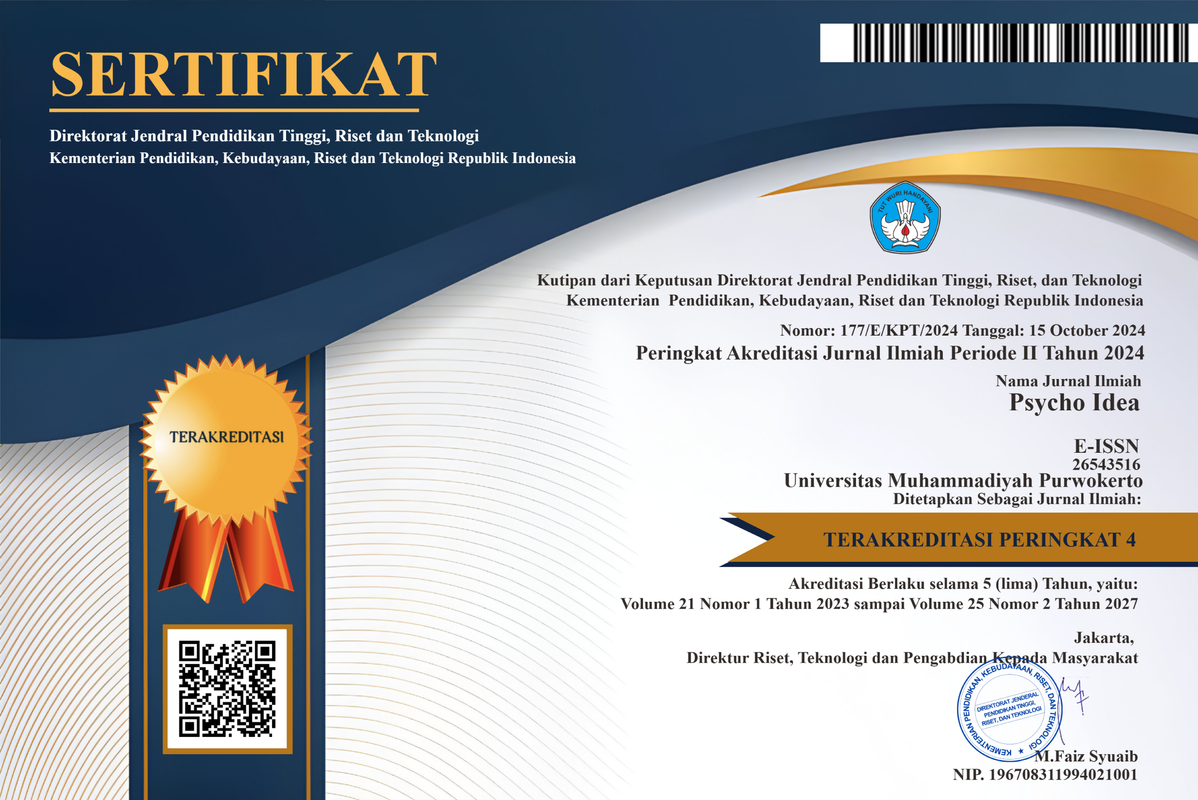Apakah Calon Pendidik Melakukan Ketidakjujuran Saat Ujian Mid Semester?
DOI:
https://doi.org/10.30595/psychoidea.v15i1.2237Abstract
Penelitian ini bertujuan untuk mengetahui bentuk ketidakjujuran akademik pada calon pendidik PAUD saat mengerjakan ujian MID semester. Partisipan dalam penelitian ini yaitu 42 mahasiswa semester 3, 5, dan 7 pada program studi PG PAUD di Universitas X di Purwokerto.Alat pengumpulan data menggunakankuesioner Vignetteyang digunakan merupakan adaptasi dari penelitian sebelumnya yang dilakukan oleh Lestari dan Asyanti (2015.Analisis data menggunakan content analysis.Hasil penelitian membuktikan bahwa bentuk perilaku tidakjujur terbanyak yang dilakukan oleh mahasiswa pada saat kesulitan mengerjakan ujian mid semester yaitu bertanya/ meminta jawaban dan mencontek..Tujuan pada situasi kesulitan mengerjakan yaitu agar dapat menyelesaikan, terpancing untuk mengingat materi, sulit mengerjakan, nilai baik, dan menjabarkan jawaban.Sedangkan bentuk perilaku tidakjujur saat melihat teman-teman mencontek didominasi oleh hasil ikut teman mencontek, selebihnya bertanya pada teman, dan browsing internet. Tujuan pada situasi melihat teman mencontek yaitu agar soal terjawab semua, dapat menyelesaikan soal, agar adil (ikut teman mencontek), bertanya pada teman terkadang salah (membuka catatan), nilai bagus, dan dapat jawaban yang berbeda.
Kata Kunci :Calon pendidik, Kejujuran, Ketidakjujuran akademik
References
Anderman, E.M., & Murdock, T.B. (2007).The Psychology Of Academic Cheating. California: Elsevier Academic Press.
Arianto, T. (2013).Tingkat Kejujuran Sosial Dan Akademik Mahasiswa Pendidikan Biologi.Prosiding Seminar Nasional X Pendidikan Biologi, 10 (1) diambil dari http://jurnal.fkip.uns.ac.id/index.php/prosbio/articlm e/view/3095
Brimble, M., & Clark, P.T. (2005). Perceptions of the Prevalence and Seriousness of Academic Dishonesty in Australian Universities The Australia. Educational Researcher. 32 (3), 19-44
Davis, S. F., Drinan, P. F., & Gallant, T.B. (2009).Cheating In School. United Kingdom: Wiley-Blackwell
Finch, J. (1978).The Vignette technique in survey research.Sosiology, 21 (1), 105144. Doi: 10.1177/0038038587021001008
Jones, L. R. (2011). Academic Integrity & Academic Dishonesty: A Handbook About Cheating & Plagiarism. Floride Institude of Technology Revised & Expanded Edition diambil dari www.fit.edu/current/documents/plagiarism.pdf
Kibler, W. L. (1993). Academic Dishonesty: A Student Development Dilemma. Naspa Journal. 30. 253-262.
Lestari, S., & Asyanti, S. (2015).Apakah siswa SMP berperilaku jujur dalam situasi ulangan?.The 2nd University Research Coloquium 2015 ISSN 24079189
Manurung, R. (2012). Pendidikan Antikorupsi Sebagai Satuan Pembelajaran Berkarakter Dan Humanistik. Jurnal Sosioteknologi, 27 (11).
Miller, N. D., Murdock, T.B., Anderman, C.M., & Poindexter, A.L. (2007). Who are all these cheaters? Characteristics of academically dishonest students.Dalam E. M. Anderman & T. B. Murdock.Psychology of academic cheating, hal 9-32. London: Elsevier Academic Press.
Minarcik, J., & Bridges, A. J. (2015). Psychology Graduate Students Weigh In: Qualitative Analysis of Academic Dishonesty and Suggestion. J Acad Ethics, 13, 197–216.
Murphy, M.M., & Banas, S. L. (2009).Character Education Overcoming Prejudice. New york: Chelsea House publisher.
Nursalam, Bani, S., & Munirah. (2013). Bentuk Kecurangan Akademik (Academic Cheating) Mahasiswa PGMI Fakultas Tarbiyah Dan Keguruan Uin Alauddin Makassar.Lentera Pendidikan, 16 (2).127-138.
Parwito. (2015). Hanya Bayar Rp 12,5 Juta Bisa Dapat Gelar S1 Tanpa Kuliah & Skripsi. Kompas Online. Dipetik Agustus 24, 2015 dari http://www.merdeka.com/peristiwa/hanya-bayar-rp-125-juta-bisa-dapatgelar-s1-tanpa-kuliah-skripsi.html.
Purnamasari, D. (2013). Faktor-Faktor yang Mempengaruhi Kecurangan Akademik Pada Mahasiswa.Educational Psychology Journal, 2 (1), 13-21.
Warsiyah, (2013).Perilaku menyontek mahasiswa muslim (pengaruh tingkat keimanan, prokrastinasi akademik dan sikap terhadap menyontek pada perilaku menyontek mahasiswa Fakultas Tarbiyah IAIN Walisongo). (Tesis, tidak diterbitkan). Institut Agama Islam Negeri (IAIN) Walisongo, Indonesia.
Downloads
Published
Issue
Section
License
Authors published in this journal agree to the following terms:
- The copyright of each article is retained by the author (s) without restrictions
- The journal allows the author(s) to retain publishing rights without restrictions
- The author grants the journal the first publication rights with the work simultaneously licensed under the Creative Commons Attribution License, allowing others to share the work with an acknowledgment of authorship and the initial publication in this journal.
- Authors may enter into separate additional contractual agreements for the non-exclusive distribution of published journal versions of the work (for example, posting them to institutional repositories or publishing them in a book), with acknowledgment of their initial publication in this journal
- Authors are permitted and encouraged to post their work online (For example in the Institutional Repository or on their website) before and during the submission process, as this can lead to productive exchanges, as well as earlier and larger citations of published work
- Articles and all related material published are distributed under a Creative Commons Attribution-4.0 International Public License (CC - BY 4.0).
License
Psycho Idea is licensed under a Creative Commons Attribution- 4.0 International Public License (CC - BY 4.0).
You are free to :
Share — copy and redistribute the material in any medium or format
Adapt — remix, transform, and build upon the material for any purpose, even commercially











